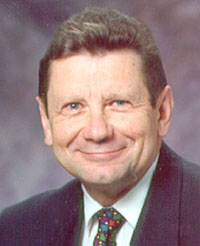Page Content
 Dr. Julius Buski’s list of accomplishments is beyond impressive: in his long career he served as secretary general, COO and CEO of the Canadian Teachers’ Federation (CTF); district governor of Rotary International District 5370; executive secretary and CEO of the Alberta Teachers’ Association; chief deputy superintendent and superintendent of Camrose School District 1315. And he was a teacher, principal and international volunteer to boot.
Dr. Julius Buski’s list of accomplishments is beyond impressive: in his long career he served as secretary general, COO and CEO of the Canadian Teachers’ Federation (CTF); district governor of Rotary International District 5370; executive secretary and CEO of the Alberta Teachers’ Association; chief deputy superintendent and superintendent of Camrose School District 1315. And he was a teacher, principal and international volunteer to boot.
Buski was born in Krakow, Poland, during World War II. His family fled Poland and spent time in displaced persons camps in northern Germany and Edinburgh before finding passage to Canada.
The Buski family settled first in Ontario before heading to Alberta, where young Julius earned his education degree at the University of Alberta. (He would later earn a master’s degree in education and a Ph.D. at the University of Oregon.)
Buski describes his life since then as three overlapping circles: the academic/professional circle, his work with Rotary, and his national and international charity work.
During his teaching career he taught at Westmount Junior High, Delwood Elementary and R. J. Scott Elementary, where he became assistant principal. He later served as principal at J. A. Fife Elementary and Kensington Elementary.
Next Buski moved to Camrose, where he became chief deputy superintendent (and acting superintendent) of Camrose School District 1315. In 1980 he joined the Association as a Professional Development executive staff officer and rose through the ranks to become the organization’s executive secretary. In that position, he played a key role in renegotiating the teachers’ pension agreement with the provincial government and showed remarkable leadership in responding to the attack on public education in the era of the Klein government cutbacks.
Buski had always felt drawn to international work—he became district governor of Rotary International District 5370, which covers an area north of Red Deer extending all the way into the Northwest Territories. With his help Rotary International has raised over half a billion dollars to fight polio since the program’s inception in 1988.
More recently, Buski served as chair of District 5370’s Belize Literacy Program Committee. Funded by a major 3H (Health, Hunger and Humanity) grant from Rotary, the program included summer workshops in teaching methods, curriculum and technology upgrades, such as solar energy panels to run generators for electricity.
For the CTF, Buski participated in the establishment of women’s networks in India and a pan-African teachers’ centre in Togo, and in forging a new relationship with Mongolia by providing assistance and instruction to teachers when that country’s second language abruptly shifted from Russian to English after the fall of the Soviet Union. During his term as secretary general of CTF Buski was proud of the continuing Project Overseas, which sends teams of teachers to developing nations each summer to provide assistance with curriculum or help local teachers set up their own professional organizations.
When asked why it’s important for teachers to build society, Buski responds:
“Teachers are role models. [They] have a great influence in their community; teachers can be a bridge between what happens in the community and what happens in kids’ lives … it is critical for [teachers] to step out of their classroom and school role and be very active community members, because we have that gift, that opportunity. … I think there’s a responsibility to give back. It’s like the Rotary motto—service before self.
“What you give is returned many times over. Those of us who give of our time, we feel that what comes back is such a blessing,” Buski concludes. “You can’t change the world by yourself, but you can make a big difference.”
